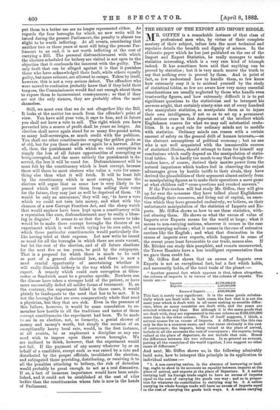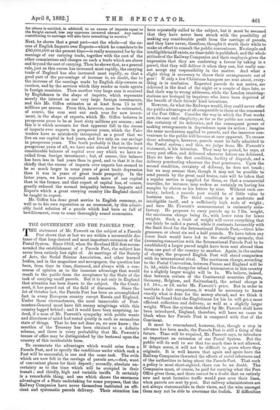THE SECRET OF 1.131.4 EXPORT AND IMPORT RIDDLE.
MR. GlIVEN is a remarkable instance of that class of professional men who, by virtue of their complete mastery of their subject, infuse into the most technical and repulsive details the breadth and dignity of science. In the elaborate paper which he has just published on the use of the Import and Export Statistics, he really manages to make statistics interesting, which is a very rare kind of triumph indeed. It has sometimes been said that anything can be proved by statistics ; but it is very much nearer the truth to say that nothing ever is proved by them. And in point of fact, so few understand how to handle them, so few know how extremely easy it is to mislead yourself by the study of statistical tables, so few are aware how very many essential considerations are usually neglected by those who handle even trustworthy figures, and how extremely difficult it is to put significant questions to the statistician and to interpret his answers aright, that certainly ninety-nine out of every hundred who manipulate statistics, so manipulate them as to injure their own intelligence, if not so as to set up a permanent and serious craze in that department of the intellect which Englishmen reserve for what we may call substantial credu- lities. It is a good rule for ordinary minds not to meddle with statistics. Ordinary minds can reason with a certain amount of safety on the general drift of human interests,—on the abstract assumptions of political economy ; but no one who is not well acquainted with the innumerable sources of statistical illusion,, should attempt to form for himself any conclusions which really depend on the manipulation of statis- tical tables. It is hardly too much to say that though the Fair- traders have, of course, derived their motive power from the natural impatience which traders feel in observing the unjust advantages given by hostile tariffs to their rivals, they have derived the plausibilities of their argument almost entirely from so manipulating figures as to make their operations a mere game at what children call" cross questions and crooked answers."
If the Fair-traders will but study Mr. Giffen, they will give up for ever the nonsense they have talked about Englishmen forestalling their resources, and living out of capital, an asser- tion which they have grounded exclusively, we believe, on their unfortunate manipulation of the statistics of Imports and Ex- ports. Mr. Giffen shows us how to use these statistics, with- out abusing them. He shows us what the excess of value of Imports over Exports means for the world at large ; *hat it means to non-carrying nations, wherever it occurs in the case of non-carrying nations ; what it means in the case of extensive carriers like the English ; and what that diminution in the excess of imports over exports, which happened in some of the recent years least favourable to our trade, means also. If Mr. Ritchie can study this pamphlet, and remain unconverted, the Tower Hamlets have a less intelligent representative than we gave them credit for.
Mr. Giffen first shows that an excess of Imports over Exports is not an exceptional fact, but a fact which holds, and necessarily holds, of the total trade of the planet :—
"Another general fact which appears is that, taken altogether, the column of imports is in excess of the column of exports. The totals are :—
Imports 21,768,000,030 Exports 1,606,000,000 Excess of Imports 2162,000,000
This fact is surely very significant. It is the same goods substan- tially which are dealt with in both cases, the fact that it is not the same year which is dealt with in all cases making no sensible differ- ence, when so many countries are dealt with, and the years are selected without any bias. But although it is the same goods that are dealt with, they are represented in the one column as £162,000,000 more than in the other column. This of itself suggests, I think, a natural reason for an excess of imports. A difference like this can only be due to a common cause, and that cause obviously is the cost of conveyance; the imports, being valued at the place of arrival, include in all the accounts the cost of conveyance ; the exports, being valued at the place of departure, do not include that cost. Hence the difference between the two columns. In so general an account, putting all the countries of the world together, I can suggest no other cause of difference."
And next, Mr. Giffen shows us, in the following admirably lucid note, how to interpret this principle in its application to individual nations :—
" 1. A non-carrying nation, in the absence of borrowing or lend- ing, ought to show in its accounts an equality between imports at the place of arrival, and exports at the place of departure. 2. A nation carrying half its foreign trade ought to have an excess of imports equal to the coat of carrying the goods one way ; and so in propor- tion for whatever its contribution to carrying may be. 3. A nation carrying its whole foreign trade will have an excess of imports equal to the cost of carrying the goods both ways. 4. A nation carrying
for others is entitled, in additiog, to an excess of imports equal to the freight earned, less any expenses incurred abroad. Any nation contributing to carriage will also have something to receive."
Next, he shows that a great part—not the whole—of the ex- cess of English Imports over Exports—which he considers to be £80,000,000 at the present time—is really accounted for by the earnings of our carrying trade, together with the cost of the other commissions and charges on such a trade which are above and beyond the cost of carrying. Then he shows that, as a general rule, just as this excess has increased most rapidly, the carrying trade of England has also increased most rapidly, so that a good part of the per-centage of increase is, no doubt, due to the increase of the earnings made by English ship-owners as carriers, and by the services which they render as trade agents in foreign countries. Then another very large sum is received by Englishmen in the shape of imports, which represents merely the interest on our very large foreign investments, and this Mr. Giffen estimates as at least from 75 to 90 millions per annum. From this, however, must be subtracted, of course, the sum sent out each year for new invest- ment, in the shape of exports, which Mr. Giffen believes in prosperous years to be at least sixty millions per annum ; and this it is which accounts for that apparent fall in the excess of imports over exports in prosperous years, which the Fair- traders have so mistakenly interpreted as a proof that we live on our capital in bad years, and live only on our savings in prosperous years. The truth probably is that in the least prosperous years of all, we have sent abroad for investment a considerable balance of capital over any which we have re- called from foreign investment ; but, of course, this balance has been less in bad years than in good, and to that it is due chiefly that the excess of imports over exports has seemed to be so much larger in some years of great trade depression than it was in years of great trade prosperity. In the latter years, we have exported much more of our capital than in the former, and that export of capital has, of course, greatly reduced the normal inequality between Imports and Exports which a great carrying country like England should be taught to expect.
Mr. Giffen has done great service to English economy, as well as to his own reputation as an economist, by this admir- ably lucid solution of a puzzle which had been so full of bewilderment, even to some thoroughly sound economists.



































 Previous page
Previous page